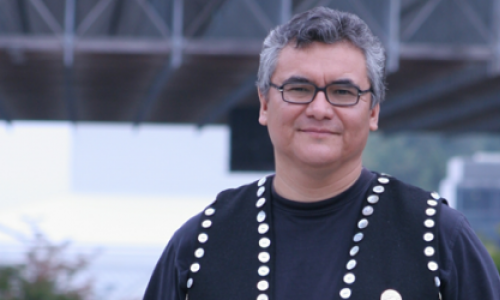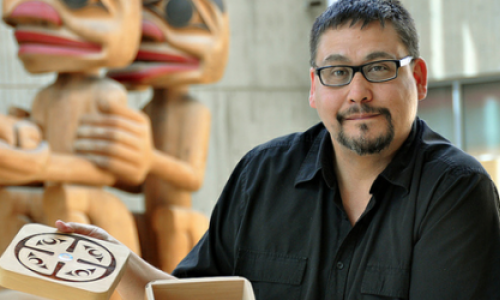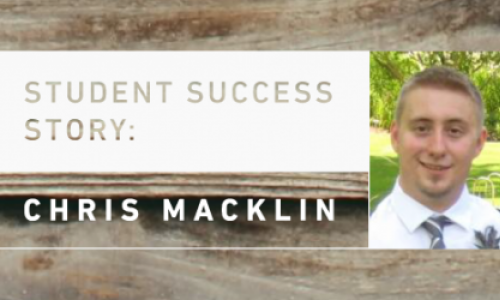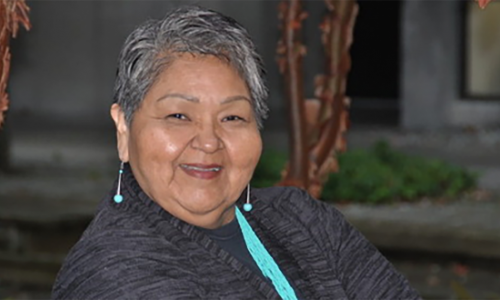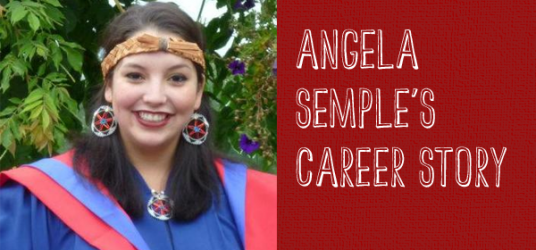
Kiʔsuʔk wiǂnam, Hu qakǂik Angela. Hello, my name is Angela.
I am a member of the Ktunaxa nation located along the Kootenay River. I grew up in Invermere, British Columbia. Invermere is a small tourist town, so my first jobs were in customer service. From scooping gelato to selling artisan wood products, I learned how to interact with people. I learned how to be polite and keep smiling even when faced with sometimes difficult attitudes. I believe every job I have had has taught me more than a few valuable skills.
As I finished high school, I knew one thing: I wanted to move to the big city. University seemed the perfect way to do this, so off I headed to SFU. Luckily, I was a strong student throughout high school, and my family really valued education so it was pretty much a natural step for me to go to post-secondary. Also, my big sister had come out to Vancouver and studied at UBC a few years earlier, so I already felt a connection to this city (though I always had to be different than her, which is why one reason I chose SFU - that and an awesome entrance scholarship that they offered me).
While here at school, I continued to work in the hospitality industry in order to make ends meet. For my first couple years I took only the recommended four courses, but one semester I felt pressured to take five… you might run into this kind of pressure yourself at some point; people think you should be doing more, or should be graduating quicker, but let me tell you, it can lead to disaster. That was the only term I ever received a D, and unfortunately that meant I didn’t get my Quantitative credit for that course (SFU requires a specific number of certain designated courses (writing, quantitative, breadth) for every student, and you have to get a C- in them to get the designated credit). In my case, I needed two Quantitative courses, both of which I had to get a C- in. This meant that I had pretty much wasted the cost of that additional course, as I still needed to do two more “Q” classes. After that I went back to taking four classes a semester, and even slowed down to three when I was doing my Honours, knowing that five was simply too much for me (especially when still working on evenings and weekends!) It is important to be aware of what you can handle, and you are the only one who needs to make that decision. Don’t let anyone put more pressure on you! Unfortunately, I do know that some forms of funding require five courses, but I also know that SFU actively works to promote four as a reasonable course-load, and that three courses is the official full-time designation.
From the beginning of my undergraduate degree, I had decided to major in English. In fact I have a clear memory of reading the course calendar and being so excited to study Shakespeare! Funnily enough, I grew to actually loathe the “classics” of English Literature, and realized that my heart lies with contemporary works, specifically those by Indigenous authors. Part of that journey for me was taking a First Nations Studies 101 course. At that time, as I was funded by my band (Akisqnuk), however, I didn’t know that this funding was my right. In fact, I thought that my band that was paying for my education—I didn’t realize that the money was there because of long-term treaty agreements with the Canadian government, and that the funding actually came from them honouring our right to Education as Indigenous peoples of this land. It’s unfortunate that many Indigenous people, including myself, have to wait until university (or even later) to learn about our histories. After FNST 101, I was hooked. I was introduced to Aboriginal literatures, and like many before me, I was excited to see stories from my own community. There are often gaps and silences in the Indigenous story. I feel that with the help of the SFU First Nations Studies department, and multiple Indigenous authors, many of those gaps and silences in my own story are coming to be filled.
So, I fell in love with Indigenous literature. I wrote my English honours paper on Richard Van Camp, a Tlicho author from the North West Territories and I wondered what I would do when I was finished. In fact, I often made jokes about how unprepared I would be for the job market after school. While an English degree gives you invaluable skills, it isn’t often recognized as such. Because of this fear of being jobless, when I neared graduation and a professor suggested I apply for graduate school, I thought, why not? That’s the funny thing about post-secondary. You apply…you get in…and you go. It all kind of just falls into place. Or, at least it did for me.
So, in fall of 2012, my partner and I packed up our car (and our poor cat who had no idea she was in for the trip of her life) and drove halfway across Canada to Saskatoon, Saskatchewan. I did a one-year MA program in English, and still, I did not know what I was going to do when I was done.
While at graduate school, I worked as a research assistant for two different professors. The more I became involved in the university, the more I thought that post-secondary education was where I wanted to be. Mind you, one Saskatchewan winter was definitely enough, and I knew I needed a break from studying at this point. I missed beautiful British Columbia, so I came back home.
Thankfully, Jordan (my partner) was welcomed back at his old job, and my dad didn’t mind helping out for a little while as we got settled back in Vancouver, because little did I know it would be more than a few months before I was actually making an income.
I sent out at least two job applications every day for weeks, often hearing nothing back. At this point I was back applying for restaurant jobs, but whether they thought I was over-qualified, or they were worried because I hadn’t served in a couple years, I wasn’t getting any bites. I also went to some painful interviews in places I wouldn’t even want to eat at, let alone serve in. It was discouraging, depressing, and hard to face. I often thought to myself “why did I go to school for all these years? What is my Master’s degree worth?” Luckily, I have great family and friends who kept reminding me of all the hard work I had done, and they continuously kept me hopeful about new opportunities. If you are approaching graduation, keep your support network strong.
Throughout all this time unemployed, I still held the goal of working at a university in mind. In fact, I held on to SFU as the place that I wanted to be. I applied for many positions that I was unqualified for, both here, and at other institutions, simply to get my name out there.
One day, while surfing craigslist I noticed a temporary job selling ice cream at an event in Rogers Arena. Having been humbled by the job market, I made the call and off I went, simply to get out there and actually make some money. Unfortunately, with the hockey lock-out on, this amounted to only a few days of work, but it gave me a purpose for those few days, and that was something I really needed at the time.
Finally, I got an interview at a hospitality group in Gastown. As the boss reviewed my resume, he looked at me and said “So, you obviously have a lot of education, when are you going to leave me for your dream job?” I was honest in saying that I currently had a couple applications in at SFU, and that was really where I wanted to be. Because it was coming up on the busy Christmas season, he asked me to commit at least until mid-December at least, and I had a full-time job!
I guess what I’m hoping you will get out of this is that perseverance is important. In fact, I just kept thinking it was really my only option. Someone had to hire me at some point, right? There had to be a good job out there just waiting for me. People say us “millennials” are entitled, but I think we are simply searching for something that we believe we are worthy of—and I don’t see how valuing yourself can be a negative thing.
The other piece of advice I have is to network, network, and network! One of the jobs I interviewed for here at SFU was only part-time, and was not really my ideal position, but I was ready to take anything. I didn’t get that job, but because I took the time to go and interview for it, my name was passed on to my current boss for a different opening. Funnily enough, he had actually heard my name from one of my past professors as well, who had known I was looking for work. I couldn’t believe when he actually contacted me about a job opportunity! This is why it is so important to get your name out there. Tell everyone you know that you need a job. Go to interviews even if you don’t think that they will go anywhere. You might just get recommended for something perfect.
Currently, my something perfect is a position as Associate Indigenous Student Recruiter here at SFU. I don’t think I had ever even thought about university recruitment before I got called in for an interview, but here I am learning, working hard, and really enjoying it. This position is a temporary contract for now, but if there is one thing I learned from my time searching for work, it’s that there’s always going to be something out there, even if it takes some time.
Beyond the Blog
-
Visit the Indigenous Student Centre.










